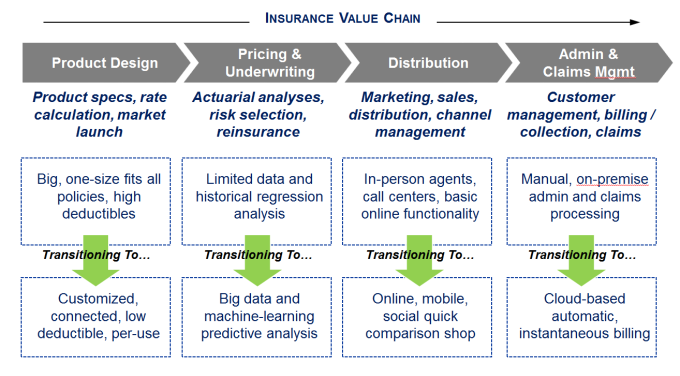News You Can Use: 6/20/2018

- The Age of Tech Superheroes Must End
Among these companies and their precursors, there are examples of smart founders who were able to use their power to help their companies grow sustainably. But they tend to be the exceptions that prove the rule. “Once a trend starts, then all founders want it, but I can count on three fingers the founders that should be in complete control of their companies with no governance or oversight,” says Sarah Cone, founder of venture capital firm Social Impact Capital.
Fortunately, the trend isn’t really catching on outside of Silicon Valley. In 2017, just 14% of companies went public with permanently unequal voting structures, according to data from the Council of Institutional Investors.
There are legitimate reasons—from the founder’s, if not necessarily the investor’s, perspective—why founders would want more control. Many serial entrepreneurs have had the experience of being pushed out of a previous company or forced to sell earlier than they would have liked. And for decades leading up to the previous tech-stock bubble, says Mr. Kedrosky, VCs had much more power than founders and were not afraid to use it. Even first-time founders have heard these stories, he adds.
https://www.wsj.com/articles/the-age-of-tech-superheroes-must-end-1528387420?ns=prod/accounts-wsj
- Young Workers No Longer Get the On-the-Job Training They Need — So They’re Finding It Elsewhere
According to Peter Capelli, director of The Wharton School’s Center for Human Resources, companies want workers they don’t have to educate, and his research has found that employers don’t train young workers like they used to.
In 1979, per Capelli, the average young worker received 2.5 weeks of training per year. By 1995, training time fell to just 11 hours.
More recent comparable data has been hard to find, says Capelli, but the Wharton professor says that by 2011 “only a fifth of employees reported receiving on-the-job training from their employers over the past five years.”
Also:
Since 2011, when Massive Open Online Courses, or MOOCs, began to gain public attention, their popularity has grown exponentially. Last year, by one estimate, 23 million people signed up to take their first MOOC. All told, since 2011, more than 800 universities have offered over 9,000 courses to 81 million registered users, according to the same report.
- Does your job match your personality?
- Good News for Hustlers: Being Busy Could Actually Be Good for You
The researchers conducted a series of eight experiments and had the participants establish the ways that they were busy, by doing things such as asking them to write down the reasons why they had such a packed schedule, or telling the undergraduates involved in the study that data found they were busier than the students at neighboring schools.
The study looked at the ways that this feeling of busyness affected how the students made decisions about the foods they ate, whether they opted to exercise or relax and whether they chose to save money for retirement versus spending it. The researchers found that when people were influenced to see themselves as busy, it boosted their ability to have self-control.
- Skipping Your Lunch Breaks? Even Your Boss Wants You to Go out for a Bite, a New Study Says.
But, according to our research, bosses want their employees to get out for a break. So, there’s a real disconnect happening, because the vast majority (88 percent) of North American bosses in the study said they thought their employees would say they were encouraged to take a regular lunch break, but only 62 percent of employees actually felt encouraged.
Takeaway: Just as great coaches recognize the need for their players to recuperate in order to perform their best, your boss likely knows that your break helps, rather than hinders, your work. But it does seem that not every boss is communicating that idea in the most effective way.
Photo by Aziz Acharki on Unsplash
News You Can Use: 4/18/2018

- Agile’s dark secret? IT has little need for the usual methodologies
With the exception of the company’s website and mobile apps, one of IT’s core principles is “buy when you can, build when you have to.” IT licenses something like 90 percent of all new functionality in the form of commercial off-the-shelf software (COTS) and software as a service (SaaS), leaving 10 percent for software developed in-house.
Scrum, Kanban, Lean Software Development and most other agile methodologies are designed for the 10 percent, not the 90 percent. On top of which, in a typical shop, about 70 percent of developer hours goes to maintaining and enhancing applications already in production, leaving 30 percent for implementing new ones.
Do the math. Agile is mostly useful for 10 percent of the 30 percent — in other words, it handles a whopping 3 percent of what IT’s application teams are called on to do.
- What To Do When A Coworker Has It In For You
What you should do really depends on whether you’re dealing with someone who dislikes or is threatened by you versus someone who is actively trying to undermine you or derail your career, Raina says. If the former, it may be a good idea to handle the situation on your own. If the latter—or if you’ve tried to confront the individual and it didn’t work or made the behavior worse—then you may need to engage your supervisor. However, if you can show that you tried to fix the issue on your own, that may show your boss that you made the effort to solve the problem first.
https://www.fastcompany.com/40554709/what-to-do-when-a-co-worker-has-it-in-for-you
- Fake News in Mexico
- 5 Ways To Reset An Unproductive Afternoon
Multitasking gets a terrible rep, but sometimes it can be a great tool when monotasking is just not getting you anywhere. As Saunders previously wrote for Fast Company, “Some situations just aren’t meant for long stretches of unbroken focus.” The trick is to experiment what form of task switching helps you best. For Saunders, task switching motivates her to work through small and boring tasks. She gives herself permission to toggle between writing business emails and looking at her calendar tasks, or she’d alternate these administrative tasks with more “exciting” work (such as book marketing). Saunders wrote, “The promise of soon being able to do something fun helps me quit procrastinating on what’s not fun.”
https://www.fastcompany.com/40550317/5-ways-to-reset-an-unproductive-afternoon
- What Can You Really Accomplish in Just an Hour?
But you’ll only make your hours matter to the extent that you displace your time wasters with planned, high-value activities you know you can accomplish in a day. That way, when you’re unconsciously reaching to check Instagram or texts, you can shift your attention back to your daily planner, open it up and then do something valuable for an hour. Do something that boosts your confidence — something that counts.
Limit time-wasters by scheduling your email, text and social check-ins as independent goals on your daily planner. Most of my clients do fine with three to five scheduled visits per day. Also, consider going on a social media cleanse
Photo by Lê Tân on Unsplash
News You Can Use: 12/14/2016

- The Best Music for Productivity? Silence
When silence and music were put head to head in more cognitively complex tests, people did better in silence. In a study from the 1980s, researchers gave subjects the option to listen to either upbeat or soft music of their preferred genre, or nothing, while counting backward. The people who listened to their favorite, upbeat tunes did worst of all, and those who heard silence did best.
- How FedEx is shaving millions from its IT costs
Apptio’s software also uncovered a glaring inefficiency in FedEx’ aircraft maintenance operations. For years, engineers inspected aircraft by climbing up and down the planes and then driving a golf cart to a shack, where they would enter data into an inventory management system, which costed $10 million annually. To streamline the process, the IT team created Workbench, which enables engineers to inspect aircraft and input data via tablets and smartphones. The software costs $2 million a year.
“We are several hundred million dollars cheaper because we keep finding unique ways to drive value,” Carter says. FedEx is applying some of the savings to emerging technologies such as TRON, a Bluetooth-enabled sensor that offers a lower cost way of tracking packages.
http://www.cio.com/article/3144504/software/how-fedex-is-shaving-millions-from-its-it-costs.html
- An island no more: Inside the business of the podcasting boom
“The interesting thing is that, in this last six to nine months, I feel like we actually turned the corner,” observes Bryan Moffett, who heads ad sales for NPM, NPR’s sale arm. NPR — the leader in podcast audience — earns more than $10 million in podcast revenue and owns a double-digit share of the market. “We’re getting in business from Wells Fargo and Dell and Target — big Fortune 100 brands.”
http://www.niemanlab.org/2016/09/an-island-no-more-inside-the-business-of-the-podcasting-boom/
- Apple Grabs Wearables Lead with Holiday Sales
A follow-up to SourceCast Episode 51For all the skepticism about the Apple Watch’s prospects, the new version appears to be selling better than the first one. Apple raked in nearly half of the revenue generated online in the U.S. wearables market in the monthlong lead-up to Cyber Monday, new data shows, a big increase on last year. Meanwhile, Fitbit lost ground—and the data shows that its expected purchase of competitor Pebble won’t help much.
https://www.theinformation.com/apple-grabs-wearables-lead-with-holiday-sales
- What this GE Exec is hiring for in 2017 (and why)
Not everybody is a software engineer, but every single person at Global Operations understands their part in GE’s transformation into a digital industrial company. Whether you’re in HR, accounting, or operations, being able to analyze and understand data is critical. We produce massive amounts of data every day and need to use it as efficiently as we can.
So even if you don’t have a degree in engineering or your job description doesn’t include data processing, we want to see how you use data every day. I look for candidates who can explain how they turn their work into actionable insights—or who can tell us how they think data might help them do their jobs better. Data is the most valuable language you can speak today.
https://www.fastcompany.com/3066215/pov/what-this-ge-exec-is-hiring-for-in-2017-and-why
Photo: wu yi
News You Can Use: 2/10/2016

- Opportunities In The Risk Business Abound As Insurance Is Ready For Disruption

Timing is everything and the industry is finally on the brink of transformative change, driven by strong secular trends. The world is online and connected — creating new distribution channels but also new risk (e.g., cybersecurity). Additionally, explosion of the shared economy and 1099 workers has created fractional ownership — and with it, uncertainty around who bears the risk.
- WHY USING YOUR POWER IN A NEGOTIATION ISN’T ALWAYS A GOOD IDEA
For example, in 2007, Wal-Mart used its power as the largest retailer of consumer goods in the United States to require the makers of liquid detergents to compact their formulas. Making detergents more concentrated was valuable to Wal-Mart, because it would save shelf space, but it would also decrease shipping costs across the supply chain. Indeed, they announced this initiative for the first time at the Clinton Global Initiative. They achieved their goal of selling only concentrated detergents by 2008.
Detergent manufacturers resisted this request at first, because there was a substantial research and development effort required by manufacturers to find a concentrated formula that would work effectively. They only undertook this development work because of the pressure from Wal-Mart, who would no longer carry detergents at their original concentration after a specified date.
Moral of the story: Walmart got exactly what it wanted… they just made it seem like it was good for everyone
http://www.fastcompany.com/3056079/hit-the-ground-running/why-using-your-power-in-a-negotiation-its-always-a-good-idea - Being a Go-Getter Is No Fun
The counter-point to this is… go ahead an bury your head in the sand and be like everyone else, you will still be in the same position as them 10 years from now.“In the workplace, managers should be careful to give the highest quality work and best opportunities to the most capable employees, and give the lower quality but time consuming work to less capable employees,” says Koval. “If someone is doing more than his fair share, compensate him for it. If not, he may ultimately leave and seek recognition elsewhere. Similarly, in our personal relationships, we should recognize that just because our high-ability partners can do something for us, doesn’t mean that we should let them. And if they do help us, we should recognize it and thank them for it. Otherwise, they too may end up feeling burdened by us, and less satisfied—and that should be the last thing we want to do to a good employee or a good partner.”
While I disagree somewhat with the premise of the article, the following quote hits home for me:
A separate experiment found that participants not only assigned more tasks to the go-getters—but underestimated how much work it would take to get the job done. “What looks easy from the outside may not feel that easy on the inside,” says Gráinne Fitzsimons, one of the co-authors of the study.
- GE’s Relocation: Great for GE, Not as Great for Boston’s Taxpayers
This was a savvy move by Boston, regardless of the incentives.Unfortunately, that future comes with a stiff price tag. Together, the city and the Commonwealth of Massachusetts offered up an estimated $145 million in business incentives ($120 million in grants and other programs from the state, and another $25 million in property-tax relief from the city) to secure the deal. By my calculations, that means that the city and state are doling out a whopping $181,250 in public subsidies per job, given GE’s own statement that its new headquarters will employ 800 people (200 corporate staff members and another 600 so-called digital industrial product managers, designers, and developers). And that doesn’t even include additional incentives such as grants for workforce training (another $1 million or so), a new “innovation center” designed to better tie GE to local universities and research institutes ($5 million more), assistance for employees to relocate to Boston, and transportation improvements in the Seaport District.
http://www.theatlantic.com/business/archive/2016/01/ge-boston-taxpayers/424938/
- Does PayStream Report on Coupa Really Matter . . . To Anyone?
For far too long in this industry, procurement professionals have sought advice from sources who are the least qualified to answer questions. Or let me put it this way . . . the sources can answer them, but the information that is provided does not often reflect what is truly happening in the real world. The reason has nothing to do with IQ – I had to write this in case anyone protested that I was calling analysts and bloggers dumb – which I am not not.
The reason has more to do with the disconnect between cause and effect. Cause being the advice, and effect being actual client outcomes.
- It’s Time to Quit the ‘Motivation Porn’ and Get Serious About Success
Since this article almost exactly describes my work mentality and how I get thing done, I will share…1. Stop watching so much television. Seriously.
Even if you’re only watching 90 minutes a day before/after work, that’s over 500 hours per year of energy spent on something with literally no return.Yes, there are some great shows. I love House of Cards, Breaking Bad and Game of Thrones. But if we’re being honest, 99 percent of TV sucks. We just watch it because we need to “relax” and we feel like there’s nothing else to do.
This philosophy applies to movies, too. Most of the time, we just watch movies because we feel like there’s nothing better to do. I’ve watched hundreds of movies that, after two hours, simply made me go “meh.” What a waste.
This is empty time when you should be working on your idea. This is the time you have to start plotting your escape.
If there’s a particular show that you really love, block out time for that particular show every week and when it’s over, turn the TV off. When you want it, make it count. If it’s not a “hell yes!” then forget it.

